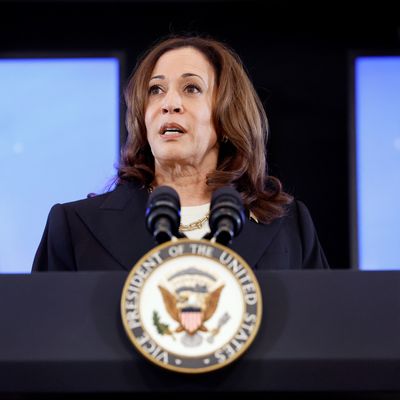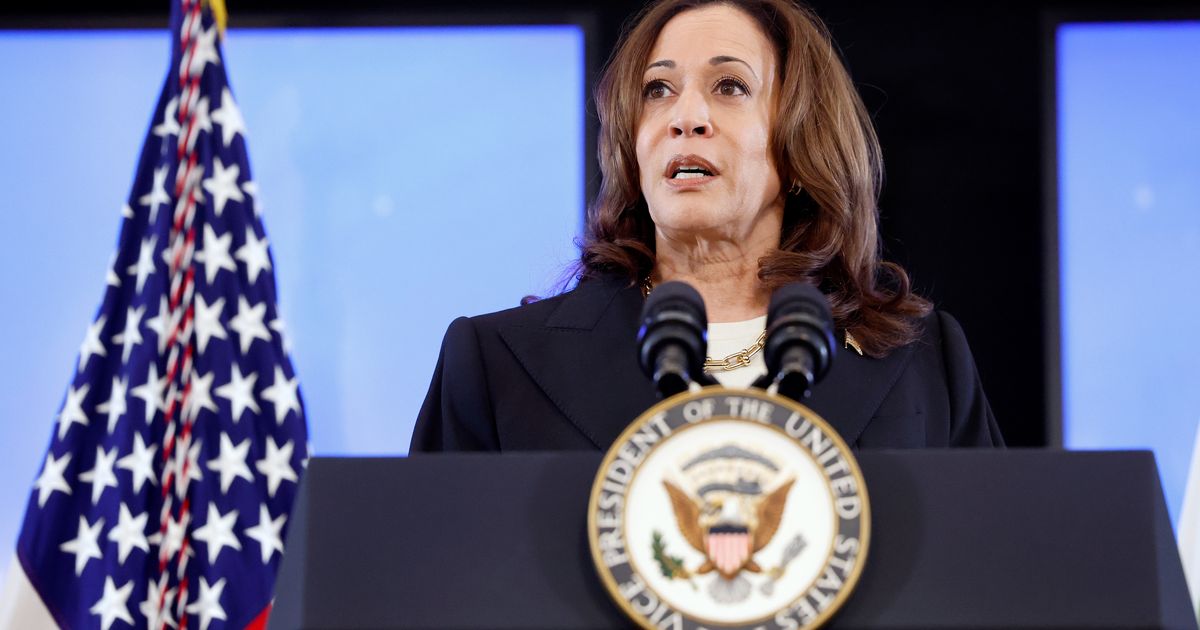
Photo: Anna Moneymaker/Getty Images
I haven’t been excited about the Democratic nominee for president since 2008, when I was 20 and all in for Barack Obama. That passion had faded by his second term, as the limitations of his liberalism became clear over time. Since then, I’ve moved left, and I’ve come to think of voting as an act of obligation, not enthusiasm. After Senator Bernie Sanders lost the nomination to Hillary Clinton in 2016, I knew I had no choice but to hold my nose and vote Democrat anyway. Four years later I did it again, for Joe Biden. Though I’m girding myself for the same tiresome exercise this year, I now have a request for the party. Don’t make me vote for an 81-year-old man who couldn’t answer a basic question about abortion last week. Give me Kamala Harris instead.
If Sanders were a decade younger, I’d write a different article, but he isn’t, and moreover, he’s a vital presence in the Senate. Our options are few, in fact. Governor Gretchen Whitmer of Michigan is an effective politician with a promising national future, even if she will never be the great hope of the American left. But she lacks name recognition outside her home state, and she’s never won a national race. The same drawbacks largely apply to Governor J.B. Pritzker of Illinois. The case for Harris, then, is partly clinical. She’s familiar. She can boast democratic legitimacy, having served on a ticket that previously beat Donald Trump. A new CNN poll also shows her “within striking distance” of the former president, an early indication that a switch may not overly harm Democratic prospects.
Thursday’s debate was clarifying. Biden’s time in power is coming to an end, no matter what his family or inner circle may think. Americans need a viable alternative to Trump and his bleak vision for the country. The case for Harris is not just clinical but moral and material. A second Trump administration could destabilize the country, impoverish the working class, and roll back rights for women and LGBT people. If Democrats are serious about protecting marginalized groups, or building on their economic legacy, they should admit the obvious: Biden can’t win. It’s Harris’s time now.
Four years ago, I could not have imagined making this argument. Harris was not my first or even second choice in 2020. She was a former prosecutor, she was gaffe prone, and her policies were technocratic to the point of oddity. (Consider her pledge to forgive student-loan debt for “Pell Grant recipients who start a business that operates for three years in disadvantaged communities.”) She supported Sanders’s Medicare for All plan until she didn’t, part of a broader pivot from the left to the center. That strategy didn’t work, of course. It made her a cipher, an unappealing contrast to the righteous conviction of Sanders or even the progressive wonkery of Senator Elizabeth Warren. Online, the so-called Khive swarmed her critics with vigorous abuse; offline, her donations dried up, and she dropped out of the primary before voting. The presidency seemed far away — until Biden picked her as a running mate.
For many people on the left, voting is a compromise. The candidates we elect won’t live up to our ideals all the time, even if they say they’re socialists. A broken political system absorbs them the moment they win. Biden was no Sanders; I never expected him to subvert the Establishment he’d served for so long. But the Biden-Harris administration outperformed my expectations in some respects. Biden has mostly lived up to his pro-labor promises, and the prospect of a GOP-controlled National Labor Relations Board should worry any union member or supporter. I want a stronger labor movement, capable of organizing more Americans into its ranks, and while that prospect does not hinge entirely or perhaps even mostly on the Democratic Party, I’d still prefer Biden’s vice-president over Trump. I have no reason to think that she would be worse on labor than Biden. I similarly believe that she would take up Biden’s broadly progressive economic policies. (They aren’t perfect, but they’re far superior to what we’d get from President Trump.) The administration has not done all it can to forgive the nation’s student-loan debt, but Harris’s old Pell Grant plan still feels unthinkable now that the conversation has so thoroughly changed. What’s more, a vote for her is a vote for an administrative state that prioritizes some version of economic progress over tax cuts for the wealthy.
I am motivated, too, by deep anger: at Biden, at his advisers, even at his family, who have reportedly urged him to stay in the race. To a point, I empathize with the humiliation he must have felt after Thursday’s debate. But he is the president, not my relative or my friend, and it isn’t my job as a voter, let alone a journalist, to coddle him. If he isn’t up to a debate against Trump, I think it’s unlikely that he is up to the presidency, which is one of the most difficult roles a person could possibly seek out for themselves. Biden’s aides have insulated him from most contact with the press or the public; it’s difficult to trust them, or him, when the party insists on his fitness. We all know what we saw on Thursday, and it’s not “bedwetting,” as a DNC email suggested, to be concerned. The implied argument — that the Biden we saw last week is somehow preferable to Harris — insults not only Harris but the intelligence of the average voter.
If this election is truly an emergency, as the Democratic Party insists, it can’t pin its hopes on Biden. It needs a steadier hand, and I believe that Harris is the best choice. It’s a shame that this is how we might get our first woman president, though representation has never ranked near the top of my political goals. I still want Medicare for All, and free public college, and student-debt forgiveness for all. I want a president whose foreign policy isn’t soaked in innocent blood. I want someone who knows the codification of Roe v. Wade is not nearly good enough. But if I can’t get what I want this year, I’d rather settle for Harris.





